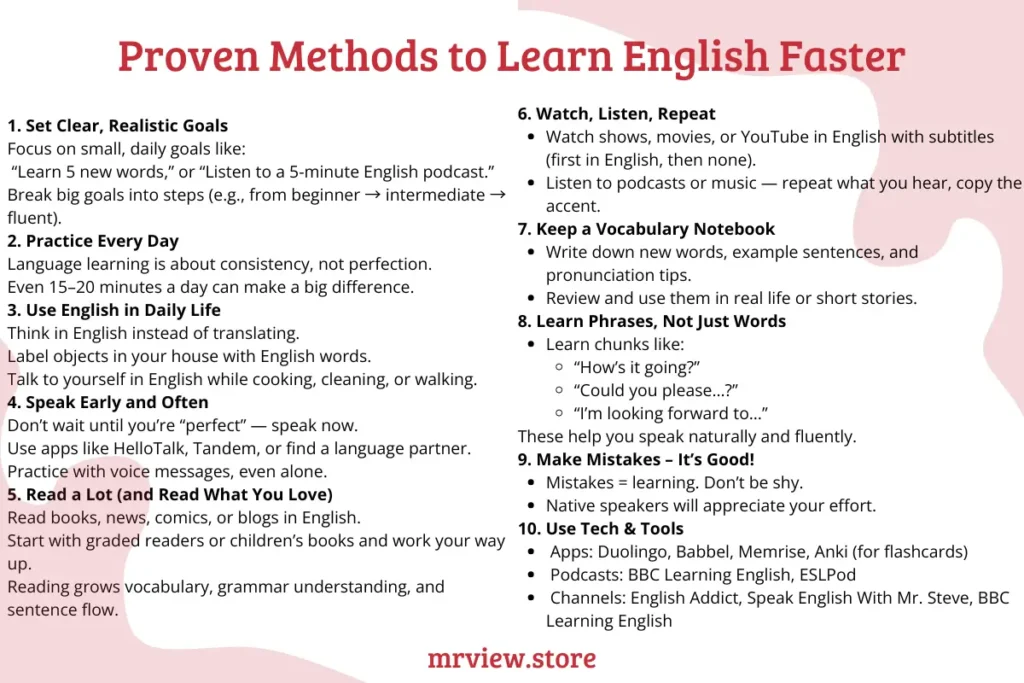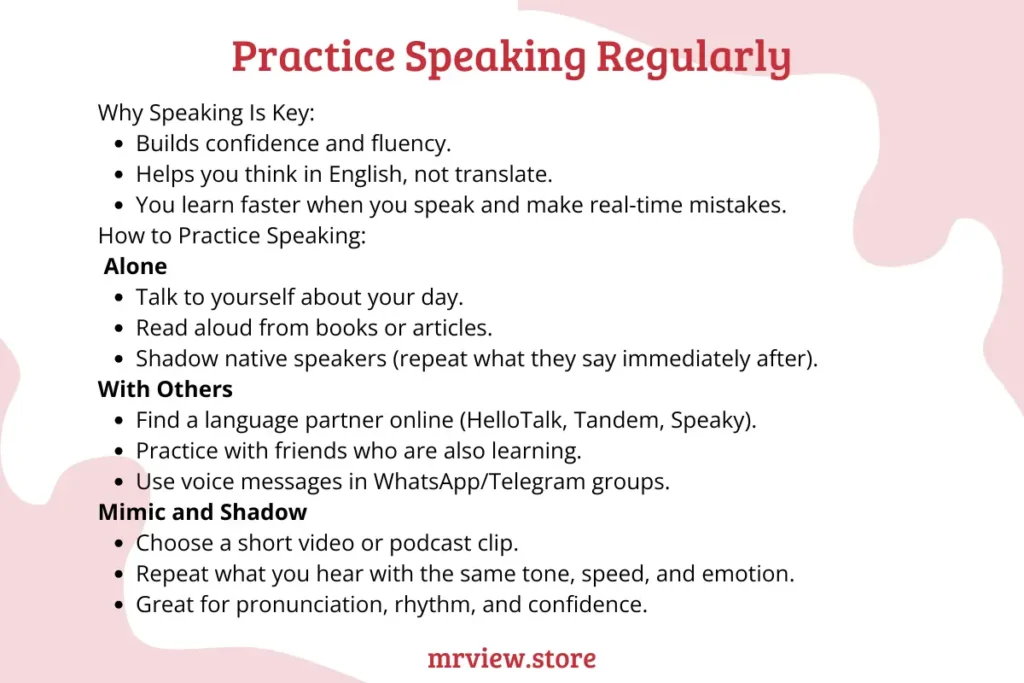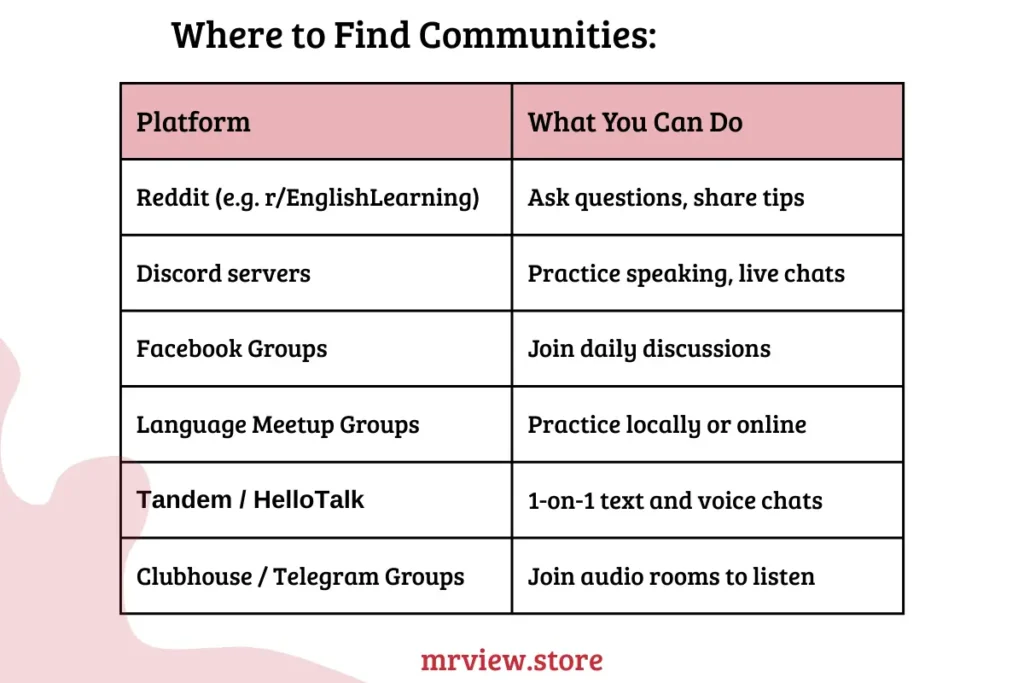So, you’re ready to boost your English skills and wondering how to do it faster without feeling overwhelmed? You’re in the right place. Mastering a new language, especially English, doesn’t have to feel like climbing Mount Everest in flip-flops. It just takes the right mix of strategy, consistency, and a dash of fun.
In this guide, we’re diving deep into practical methods that actually help you learn English faster—not gimmicks, but real tools and habits backed by learners worldwide. Whether you’re a total beginner or just trying to sound more fluent, these tips will guide you toward fluency without burning you out.
We’ll explore everything from language immersion to goal-setting, plus highlight common mistakes to avoid along the way. Oh, and don’t worry—we’ve sprinkled in answers to FAQs, expert resources, and some language hacks you’ll wish you knew sooner.
Alright, let’s jump in!
Proven Methods to Learn English Faster
Immerse Yourself in the Language
Ever heard the phrase, “sink or swim”? That’s basically what language immersion is all about—and it works wonders. When you surround yourself with English, you’re forcing your brain to adapt and absorb naturally. Think of it as giving your brain a daily English bath.
How to do it:
- Change your phone or social media settings to English.
- Label objects around your home with sticky notes in English.
- Watch your favorite shows, but switch the audio to English—even better with English subtitles.
Even just a few tweaks in your daily routine can supercharge your vocabulary and listening skills. And hey, don’t be afraid of confusion—it’s part of the magic.
Engage with Native Speakers
Look, textbooks are helpful, but real conversations? That’s where the magic happens. Speaking with native or fluent speakers helps you pick up natural sentence structures, idioms, and everyday expressions you won’t find in grammar guides.
You can:
- Join language exchange meetups.
- Use platforms like Tandem or HelloTalk.
- Participate in English-speaking Discord or Reddit communities.
One fun idea? Try asking strangers in online forums how their day’s going. You’ll be surprised how quickly your confidence grows—and mistakes? Totally welcome.

Master the Art of Active Listening
Listen With Purpose, Not Just for Fun
Sure, binging English shows on Netflix feels productive—but unless you’re actively listening, you’re missing out on gold. So what does active listening actually mean? It’s when you engage your brain while listening, not just letting the words wash over you.
Try this:
- Listen to a short podcast episode or news clip.
- Pause after every few sentences.
- Repeat what you heard out loud (yes, like a parrot!).
- Write down new phrases and try using them later.
Podcasts like The English We Speak from BBC Learning English are perfect bite-sized tools to practice.
Use Subtitles Wisely
Subtitles can be your best friend—or your worst crutch. At the beginning, use English subtitles with English audio to help connect pronunciation with spelling. But as you improve, turn off the subtitles and challenge your ears.
Eventually, aim for:
- English audio, no subtitles ✅
- Jotting down unfamiliar words
- Rewatching to catch missed phrases
Not only does this build your comprehension, but it also boosts your pronunciation over time—because you start noticing the natural rhythm of speech.
Shadowing Technique: Mimic Like a Pro
This one’s a game-changer. The shadowing technique is when you listen to a short sentence and immediately repeat it aloud, matching tone, speed, and accent.
Here’s how:
- Pick a short clip or sentence.
- Play it once and listen carefully.
- Play it again and speak at the same time.
- Record yourself. (Cringe later.)
Yes, it’s awkward at first—but your speaking fluency and intonation will thank you.
Read Like a Language Learner—Not Like a Native
Choose the Right Material for Your Level
Reading is a game-changer when you’re learning English—but only if you’re reading the right stuff. Don’t jump straight into Shakespeare. Start with graded readers, comic books, or children’s novels. Why? Because they’re:
- Fun
- Easy to follow
- Filled with useful everyday vocabulary
Once you’re comfy, level up with online articles, short stories, or even The Guardian’s Learning English section to dip into real-world English.
Highlight and Learn in Context
Memorizing random words from flashcards? Meh. Learning new vocabulary in context? That’s where the magic happens.
Try this:
- Highlight unfamiliar words.
- Guess their meaning from the sentence.
- Then double-check with a dictionary.
- Note down the whole sentence, not just the word.
That way, you’ll remember not just the word, but how it’s used naturally—which helps you sound way more fluent.
Summarize What You Read
After reading a short article or story, pause. Think about what you just read. Then, try writing or saying a quick summary in English. This boosts:
- Reading comprehension
- Speaking fluency
- Grammar recall
Boom—three skills with one move.
Reading daily, even for just 10–15 minutes, compounds over time. You’ll start noticing your vocabulary bank expanding, your grammar improving naturally, and your confidence soaring.
Speak English Daily—No Matter Where You Are
Talk to Yourself (Yes, Really)
Here’s the thing: speaking out loud rewires your brain for fluency. If you can’t find someone to chat with, be your own practice partner! Narrate your day like:
- “I’m making coffee right now.”
- “Let’s get started on homework.”
- “What should I eat for lunch?”
This habit helps you think in English and gets your pronunciation and grammar flowing naturally.

Use Language Exchange Apps
No English speakers in your area? No problem! Apps like HelloTalk and Tandem connect you with native speakers worldwide. You teach them your language; they help you with English. Win-win!
These conversations feel more like:
- Friendly chats
- Casual voice messages
- Real-life speaking practice (with gentle corrections!)
Practice With Voice Assistants and Shadowing
Try talking to Siri, Alexa, or Google Assistant in English. You’d be surprised how helpful it is. Also, ever heard of shadowing? It’s when you:
- Listen to a short sentence or phrase.
- Immediately repeat it, mimicking the accent, tone, and rhythm.
Great for building native-like pronunciation and confidence speaking.
Join Online Conversation Clubs
Yep, there are free ones! Websites like ConversationExchange offer virtual meetups or partner matching. These sessions give you:
- Real-time conversations
- Cultural tips
- New vocabulary in action
So, even if you’re chilling in your bedroom, you can still have a full-on English conversation with someone halfway across the globe.
Immerse Yourself in English Through Entertainment
Watch Movies & TV Shows (Without Subtitles First!)
Movies and shows aren’t just for downtime—they’re a secret language-learning goldmine. Choose content with:
- Clear speech (think sitcoms like Friends)
- Everyday conversation
- Realistic vocabulary
Try watching once without subtitles to test your ears. Then, rewatch with English subtitles to catch what you missed. This trick boosts both listening skills and contextual vocabulary.
Bonus: Mimic your favorite characters to improve intonation and rhythm—it’s fun and surprisingly effective.
Listen to English Podcasts or Audiobooks
Whether you’re cooking, walking, or lying in bed, plug in your headphones and turn on an English podcast. Start with beginner-friendly options like:
- The English We Speak by the BBC
- ESL Pod (Easy English audio with explanations)
Audiobooks, especially fiction, help build your imagination and comprehension. Choose ones you already love in your native language—makes it easier to follow along in English.
Create an English-Only Playlist
Yes, music counts too! Songs can:
- Teach you slang and idioms
- Train your ear to understand fast speech
- Help you memorize phrases through rhythm
Pause, rewind, and write down lyrics. Sing along for pronunciation practice that doesn’t feel like work at all.
Follow English-Speaking YouTubers
Vloggers and creators on YouTube offer real-world English in action. Whether it’s travel, tech, or beauty, find a niche you’re into. Watching daily life videos helps you learn natural expressions, casual speech, and even cultural cues.
Example: Channels like Speak English with Mr. Duncan or English Addict are made just for learners and are super entertaining.
Track Your Progress and Stay Consistent
Set SMART Goals for English Learning
If you’re just saying, “I want to speak better English,” that’s great—but not quite enough. You need goals that are:
- Specific: “I want to learn 20 new words this week.”
- Measurable: “I’ll test myself every Friday.”
- Achievable: Don’t aim to be fluent in a week—be real.
- Relevant: Stick to topics you care about (travel, work, daily talk).
- Time-bound: Set a deadline so you keep moving forward.
With SMART goals, every small win feels like a major milestone.
Use a Language Journal or App
Documenting your learning journey helps reinforce everything. Write down:
- New vocabulary
- Phrases or idioms
- Mistakes you made—and corrected
- Thoughts in English
Or, if you prefer digital tools, apps like Anki or Quizlet are perfect for making flashcards and reviewing on the go.
You can also check out Cambridge English Progress Checker to assess your level and improvements over time.
Celebrate Your Success (Even the Tiny Ones!)
Learned how to order coffee in English without freezing up? That’s a win. Watched a full movie with no subtitles? High five! Celebrating small victories keeps you energized. Maybe treat yourself to a new English book or post about your progress online—whatever keeps you pumped.
Stick to a Daily English Routine
Learning faster isn’t about doing more all at once—it’s about doing a little every day. Just 15–30 minutes of active learning daily adds up quickly:
- 5 minutes of vocabulary
- 10 minutes listening
- 15 minutes speaking or writing
Make English a habit, like brushing your teeth. Once it’s a regular part of your life, it stops feeling like homework.
Practice Speaking and Join a Language Learning Community
Speak English Every Single Day
You’ve heard it before, and we’re saying it again—practice makes perfect. But when it comes to language, it’s not just about quantity. It’s about quality and consistency. Speak out loud every day. Narrate what you’re doing, talk to your pet, or pretend you’re teaching someone else. It may sound silly, but it works.
Here’s the kicker: Don’t just practice in your head—say it out loud. Your tongue and brain need to sync up. Even 5 minutes a day of spoken English can make a world of difference.
Find a Language Partner or Speaking Buddy
You don’t need to book a pricey tutor to get talking. You just need someone to chat with. Try:
- HelloTalk or Tandem – language exchange apps
- Reddit’s language learning communities
- Facebook groups for English learners

Practice basic conversations, role-play job interviews, or just talk about your day. The point is to get real-time feedback and boost your confidence.
A great place to find free speaking practice is ConversationExchange.com, where learners match with partners around the world.
Join Online Forums, Groups, and Communities
Surround yourself with other learners and native speakers. Join:
- Discord servers for language learners
- Reddit threads like r/EnglishLearning
- Facebook groups focused on ESL or TOEFL prep
Not only will you get advice, but you’ll also find people who get your struggles—and help celebrate your wins.
Attend Virtual Meetups and Speaking Clubs
Thanks to the internet, you can now join English-speaking meetups without even leaving your house. Try platforms like:
- Meetup.com (search for “English conversation”)
- Speaky
- Local library or school-organized Zoom sessions
The goal here? Break the fear of speaking. The more you do it, the easier it becomes. And before long, you’ll be chatting like a pro without second-guessing every sentence.
FAQs
1. What is the fastest way to improve English skills?
The fastest way is to immerse yourself in English daily—listen, speak, read, and write. Combine active learning (grammar, vocabulary drills) with passive input like podcasts and videos. Speak with native or fluent speakers whenever possible.
2. How long does it take to become fluent in English?
It varies, but with consistent daily practice, most learners reach conversational fluency in 6 months to 1 year. Factors like your native language, exposure, and study methods affect the timeline.
3. Can I learn English by myself at home?
Absolutely! With tools like language apps, YouTube lessons, and English books, self-study is 100% possible. Joining online forums or language exchange apps also brings valuable practice into your routine.
4. What should I focus on first: grammar or vocabulary?
Start with basic vocabulary and commonly used phrases to get speaking quickly. Once you’re familiar with simple words, gradually learn grammar rules in context—not just memorization.
5. Is it necessary to speak with native English speakers?
While not necessary, it’s incredibly helpful. Native speakers offer natural pronunciation and real-life phrases. However, speaking with fluent non-natives can also boost your confidence and comprehension.
6. Which apps are best for learning English fast?
Popular ones include:
- Duolingo (fun for beginners),
- Babbel (structured learning),
- HelloTalk and Tandem (for speaking practice),
- Anki or Quizlet (for spaced repetition flashcards).
Conclusion
Learning English doesn’t have to be a slow, boring grind—it can actually be fun, fast, and fulfilling! By using these proven methods—from immersive listening and speaking techniques to leveraging smart tools and maintaining a steady routine—you’ll find yourself understanding, speaking, and thinking in English more naturally every single day.
And remember, it’s not about perfection—it’s about progress. So keep practicing, stay curious, and trust the process. Whether you’re watching shows, chatting online, or journaling your thoughts, every little step brings you closer to fluency. The key? Consistency and confidence.
Start small, stay focused, and soon enough, you’ll be mastering English like a pro. You’ve got this!
